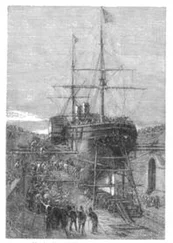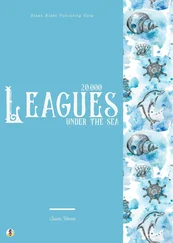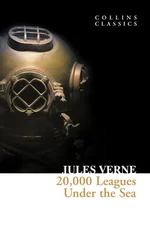Jules Verne - Twenty Thousand Leagues Under the Sea
Здесь есть возможность читать онлайн «Jules Verne - Twenty Thousand Leagues Under the Sea» — ознакомительный отрывок электронной книги совершенно бесплатно, а после прочтения отрывка купить полную версию. В некоторых случаях можно слушать аудио, скачать через торрент в формате fb2 и присутствует краткое содержание. Жанр: sf_writing, на английском языке. Описание произведения, (предисловие) а так же отзывы посетителей доступны на портале библиотеки ЛибКат.
- Название:Twenty Thousand Leagues Under the Sea
- Автор:
- Жанр:
- Год:неизвестен
- ISBN:нет данных
- Рейтинг книги:5 / 5. Голосов: 2
-
Избранное:Добавить в избранное
- Отзывы:
-
Ваша оценка:
- 100
- 1
- 2
- 3
- 4
- 5
Twenty Thousand Leagues Under the Sea: краткое содержание, описание и аннотация
Предлагаем к чтению аннотацию, описание, краткое содержание или предисловие (зависит от того, что написал сам автор книги «Twenty Thousand Leagues Under the Sea»). Если вы не нашли необходимую информацию о книге — напишите в комментариях, мы постараемся отыскать её.
Twenty Thousand Leagues Under the Sea — читать онлайн ознакомительный отрывок
Ниже представлен текст книги, разбитый по страницам. Система сохранения места последней прочитанной страницы, позволяет с удобством читать онлайн бесплатно книгу «Twenty Thousand Leagues Under the Sea», без необходимости каждый раз заново искать на чём Вы остановились. Поставьте закладку, и сможете в любой момент перейти на страницу, на которой закончили чтение.
Интервал:
Закладка:
As I expected, during the night a new block a yard square was carried away, and still further sank the immense hollow. But in the morning when, dressed in my cork-jacket, I traversed the slushy mass at a temperature of six or seven degrees below zero, I remarked that the side walls were gradually closing in. The beds of water furthest from the trench, that were not warmed by the men's mere work, showed a tendency to solidification. In presence of this new and imminent danger, what would become of our chances of safety, and how hinder the solidification of this liquid medium, that would burst the partitions of the Nautilus like glass?
I did not tell my companions of this new danger. What was the good of damping the energy they displayed in the painful work of escape? But when I went on board again, I told Captain Nemo of this grave complication.
"I know it," he said, in that calm tone which could counteract the most terrible apprehensions. "It is one danger more; but I see no way of escaping it; the only chance of safety is to go quicker than solidification. We must be beforehand with it, that is all."
On this day for several hours I used my pickaxe vigorously. The work kept me up. Besides, to work was to quit the Nautilus, and breathe directly the pure air drawn from the reservoirs, and supplied by our apparatus, and to quit the impoverished and vitiated atmosphere. Toward evening the trench was dug one yard deeper. When I returned on board, I was nearly suffocated by the carbonic acid with which the air was filled-ah! if we had only the chemical means to drive away this deleterious gas! We had plenty of oxygen; all this water contained a considerable quantity, and by dissolving it with our powerful piles, it would restore the vivifying fluid. I had thought well over it; but of what good was that, since the carbonic acid produced by our respiration had invaded every part of the vessel? To absorb it, it was necessary to fill some jars with caustic potash, and to shake them incessantly. Now this substance was wanting on board, and nothing could replace it. On that evening, Captain Nemo ought to open the taps of his reservoirs, and let some pure air into the interior of the Nautilus; without this precaution, we could not get rid of the sense of suffocation. The next day, March 26th, I resumed my miner's work in beginning the fifth yard. The side walls and the lower surface of the iceberg thickened visibly. It was evident that they would meet before the Nautilus was able to disengage itself. Despair seized me for an instant, my pickaxe nearly fell from my hands. What was the good of digging if I must be suffocated, crushed by the water that was turning into stone-a punishment that the ferocity of the savages even would not have invented! Just then Captain Nemo passed near me. I touched his hand and showed him the walls of our prison. The wall to port had advanced to at least four yards from the hull of the Nautilus. The captain understood me, and signed to me to follow him. We went on board. I took off my cork-jacket, and accompanied him into the drawing-room.
"M. Aronnax, we must attempt some desperate means, or we shall be sealed up in this solidified water as in cement."
"Yes; but what is to be done?"
"Ah! if my Nautilus were strong enough to bear this pressure without being crushed!"
"Well?" I asked, not catching the captain's idea.
"Do you not understand," he replied, "that this congelation of water will help us? Do you not see that, by its solidification, it would burst through this field of ice that imprisons us, as, when it freezes, it bursts the hardest stones? Do you not perceive that it would be an agent of safety instead of destruction?"
"Yes, captain, perhaps. But whatever resistance to crushing the Nautilus possesses, it could not support this terrible pressure, and would be flattened like an iron plate."
"I know it, sir. Therefore we must not reckon on the aid of nature, but on our own exertions. We must stop this solidification. Not only will the side walls be pressed together; but there is not ten feet of water before or behind the Nautilus. The congelation gains on us on all sides."
"How long will the air in the reservoirs last for us to breathe on board?"
The captain looked in my face. "After to-morrow they will be empty!"
A cold sweat came over me. However, ought I to have been astonished at the answer? On March 22, the Nautilus was in the open polar seas. We were at 26 . For five days we had lived on the reserve on board. And what was left of the respirable air must be kept for the workers. Even now, as I write, my recollection is still so vivid that an involuntary terror seizes me, and my lungs seem to be without air. Meanwhile Captain Nemo reflected silently, and evidently an idea had struck him; but he seemed to reject it. At last, these words escaped his lips:
"Boiling water!" he muttered.
"Boiling water?" I cried.
"Yes, sir. We are inclosed in a space that is relatively confined. Would not jets of boiling water, constantly injected by the pumps, raise the temperature in this part, and stay the congelation?"
"Let us try it," I said resolutely.
"Let us try, professor."
The thermometer then stood at seven degrees outside. Captain Nemo took me to the galleys, where the vast distillatory machines stood that furnished the drinkable water by evaporation. They filled these with water, and all the electric heat from the piles was thrown through the worms bathed in the liquid. In a few minutes this water reached a hundred degrees. It was directed toward the pumps, while fresh water replaced it in proportion. The heat developed by the troughs was such that cold water, drawn up from the sea, after only having gone through the machines, came boiling into the body of the pump. The injection was begun, and three hours after the thermometer marked six degrees below zero outside. One degree was gained. Two hours later, the thermometer only marked four degrees.
"We shall succeed," I said to the captain, after having anxiously watched the result of the operation.
"I think," he answered, "that we shall not be crushed. We have no more suffocation to fear."
During the night the temperature of the water rose to one degree below zero. The injections could not carry it to a higher point. But as the congelation of the sea-water produces at least two degrees, I was at last reassured against the dangers of solidification.
The next day, March 27, six yards of ice had been cleared, four yards only remaining to be cleared away. There was yet forty-eight hours' work. The air could not be renewed in the interior of the Nautilus. And this day would make it worse. An intolerable weight oppressed me. Toward three o'clock in the evening, this feeling rose to a violent degree. Yawns dislocated my jaws. My lungs panted as they inhaled this burning fluid, which became rarefied more and more. A moral torpor took hold of me. I was powerless, almost unconscious. My brave Conseil, though exhibiting the same symptoms and suffering in the same manner, never left me. He took my hand and encouraged me, and I heard him murmur, "Oh, if I could only not breathe, so as to leave more air for my master!"
Tears came into my eyes on hearing him speak thus. If our situation to all was intolerable in the interior, with what haste and gladness would we put on our cork-jackets to work in our turn! Pickaxes sounded on the frozen ice-beds. Our arms ached, the skin was torn off our hands. But what were these fatigues, what did the wounds matter? Vital air came to the lungs! We breathed! We breathed!
All this time no one prolonged his voluntary task beyond the prescribed time. His task accomplished, each one handed in turn to his panting companions the apparatus that supplied him with life. Captain Nemo set the example, and submitted first to this severe discipline. When the time came he gave up his apparatus to another, and returned to the vitiated air on board, calm, unflinching, unmurmuring.
Читать дальшеИнтервал:
Закладка:
Похожие книги на «Twenty Thousand Leagues Under the Sea»
Представляем Вашему вниманию похожие книги на «Twenty Thousand Leagues Under the Sea» списком для выбора. Мы отобрали схожую по названию и смыслу литературу в надежде предоставить читателям больше вариантов отыскать новые, интересные, ещё непрочитанные произведения.
Обсуждение, отзывы о книге «Twenty Thousand Leagues Under the Sea» и просто собственные мнения читателей. Оставьте ваши комментарии, напишите, что Вы думаете о произведении, его смысле или главных героях. Укажите что конкретно понравилось, а что нет, и почему Вы так считаете.












